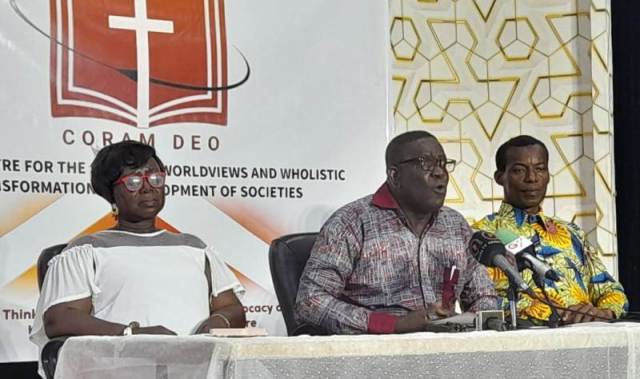The Africa Centre for the Study of Worldviews and Wholistic Development of Societies was recently inaugurated as a think tank dedicated to finding solutions to Africa’s most pressing dilemmas.
Dr. Christopher Ampadu spearheaded this initiative, which seeks to unravel the complexities underlying Africa’s paradox of abundant natural and human resources, alongside widespread poverty, hunger, and disease.
During the launch on Monday, March 25, Dr. Ampadu elaborated on the Centre’s vision and also posed critical questions regarding the role of the Church and the essence of Christianity in addressing societal woes.
“The Centre’s mission goes beyond academic research; it’s about igniting a transformative development across Africa by challenging the accepted narratives of despair,” Dr. Ampadu said.
He emphasized the need for a holistic approach that scrutinizes the underlying belief systems, cultural values, and behaviours that perpetuate the continent’s struggles.
Dr. Ampadu shed light on the ironic situation where Africa, despite being the most evangelized continent south of the Sahara, continues to grapple with corruption, greed, and a myriad of social vices.
“In a country like Ghana, where the Christian population exceeds 70%, and churches abound, the pervasive corruption stands as a stark contradiction to the teachings of Christ,” he stated, drawing attention to the disparity between religious fervour and ethical conduct.
The Centre’s advocacy for the Kingdom of God and the application of godly values and principles is set against this backdrop of ethical paradoxes.
Dr. Ampadu called for a Church that extends beyond denominational expansion and religious activities to one that actively disciples nations, influencing every sphere of life from politics and finance to education and health.
“Being a Christian is not merely about spiritual programs or the afterlife; it’s about embodying Christ’s teachings in our daily lives, impacting our communities and society at large,” Dr. Ampadu stressed.
He criticized a form of religiosity devoid of societal impact, questioning the purpose of a Church that rejoices in rituals while neglecting the urgent needs of its communities.
Highlighting the imperative for the Church to lead by example, Dr. Ampadu called for a reorientation towards humility, service, and community engagement.
He invoked 2 Chronicles 7:14 and urged Ghanaians to humble themselves, pray, seek God’s face, and turn from their wicked ways as a path toward healing their land.
The Africa Centre for the Study of Worldviews and Wholistic Development of Societies aspires to be the beacon of hope and a catalyst for change.
Employing research with practical training and advocacy, it aims to equip individuals with the knowledge and tools to enact meaningful transformation within their societies.
Dr. Ampadu provided a poignant reminder: “If the Church fails to disciple the nations, the nations will disciple the Church.”
He charged believers to rise above complacency, to engage with the world in a manner that reflects the teachings of Christ, and to work tirelessly towards the betterment of their communities and, by extension, the continent of Africa.




